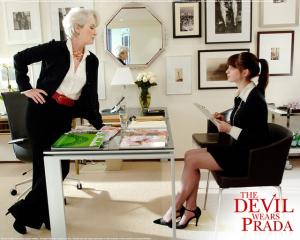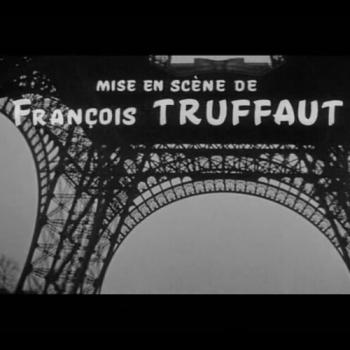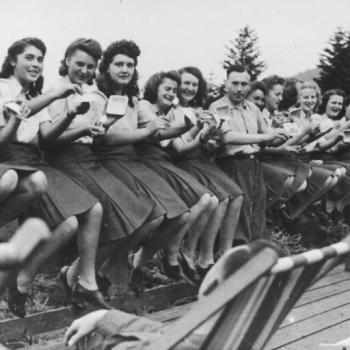
Source: Flicker user Duncan Chen
License
I have become a man, undertaken a solemn duty impressed only upon film critics, fathers, and husbands. These reviews are read by fewer people than live in the Falklands. I have no children. My wife brought me before the audiovisual altar to drink deep from the cup of her childhood. I watched The Devil Wears Prada (2006). David Frankel (directing) and Alina Brosh McKenna’s Anne Hatheway and Meryl Streep-driven adaptation of a novel about publishing, fashion, and the gosh-darned American way was not made for me. But, as it turns out, I was made for it, molded since my teen-boy days into a bona-fide appreciator of the so-called “chick flick.”
Do I say this with pride? Yes. Should you care? Probably not. You ought to care only because, well, this is a fine film.
The Devil Wears Prada is where the rubber meets the road for inspiring, young adult and teen movies. Andrea “Andy” Sachs (Anne Hathaway), a recent graduate from Northwestern, has moved to the big city (New York, of course) zealous for her big journalistic break. Woodward and Bernstein are never far from her mind (she broke a big campus story about the janitors’ union, dontchaknow?). In the film’s first protracted scene, she shows up at the offices of Runway, a Vogue analogue, where the boss’ first secretary (not the head of a communist party but an executive assistant) laughs her out of the room. Andy is plain, an Annie Hall denuded of quirk. All sweaters and no stilettos. Just as our aspiring muckraker retreats from the building, she’s called back in. The editor-in-chief of Runway, Miranda Priestly (Meryl Streep), sees something in Andy. Of course, that something is a frumpiness so absolute that, after the last two fashionista second assistants failed, Priestly reasons she’s got nothing to lose. Andy’s on board. And before she knows it, she’s chained to a beeper like Cool Hand Luke to a ball and chain (never seen the movie, but I assume that’s about right). Miranda Priestly is her life. Such are the demands of haute couture.
The title gives the whole game away. Miranda Priestly is indeed demanding, demonic in her soul-leeching neediness. She needs her coffee at this temperature at this time (and always from Starbucks). Fail to get her a flight through a hurricane from Florida to New York while you’re busy entertaining your visiting father? Better make nice by obtaining two unpublished copies of the next Harry Potter book (one for each of Miranda’s twins). She has standards higher than the day is long. Her true devilishness, however, lies in her allure. Miranda’s exacting nature inspires. She lives and breathes fashion, not as some art of ornamenting the human body, but as its essence, as if how we attire ourselves makes the world spin, and therefore as if how she tells the masses to dress formed the earth’s axis. Allured by this newfound worldview, Andy begins adorning herself along the Runway model. Now she wears lipstick and goes to parties, talks to writers for magazines like The New York Review Books. Stylish and competent, Andy’s seduction—c’est complet.
While Hathaway and many others do an excellent job, none of this subtle shift from Cerberus to succubus would be possible without Streep’s performance. Her Miranda Priestly never shouts. No. An adherent of the “I am not mad; I’m disappointed” school of parenting, Streep’s fashionista radiates disaffection, a giant among dwarves. Her voice is soft and taut, spoken almost as in a constant exasperated whisper. Like the snake in the Garden, her weapon is her magnetism, the unassailable logic with which she presents the injustice of any other way of being. Aspiring girl boss meets the real thing, the corporate woman made velveteen flesh.
The conflict, then, that drives the film forward concerns Andy the doughty investigative scrivener and her Prada-toting alter ego. Her old friends from Northwestern love the freebies she can dole out, even if they hate how little she’s around and how seldom she sees her boyfriend Nate (Adrian Grenier), another member of their group. Miranda’s life is as intoxicating as it is ruthless. Can Andy take the final step? Leave her boyfriend for a highfaluting writer and pettifog her way through fashion Versailles? If she impresses Priestly, who knows how far she can go.
Despite its predictable rom-com-esque ending, The Devil Wears Prada rarely strays from this embattled and embittering course. Andy will sleep with the writer. She will witness Priestly sell her friends out. Andy, slowly but surely, will find herself doing much the same. If a more cynical mainstream teen movie has ever graced the silver screen, I’m unaware of it. Streep makes the devil beguiling, even sympathetic. Being the devil, however, means looking out for number one—a salient point. Not, of course, to suggest anything about our own infatuation with the powerful.

















